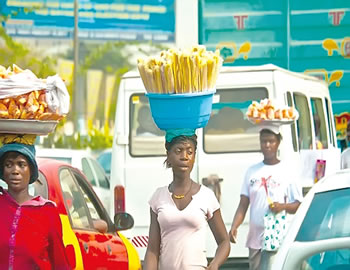Recently, the Lagos State government banned street trading, re-enacting a law capable of convicting both buyer and seller. AKIN ADEWAKUN in this report writes on the survival strategies of street hawkers in their attempts to escape arrest by law enforcement agents of the state government.
SHE stood by the roadside, apprehensive and highly suspicious of the person next to her. But placed very firmly on her head was that bowl of chilled sachets of water and assorted soft drinks, from where she sold to customers often trapped in the long and heavy traffic on Iyana-Ipaja Bridge, desirous of quenching their heat-induced thirst while they endure the long tortuous journeys to their destinations.
But unlike before when Kehinde, the street trader, could openly move from one spot to the other, this time around even in the same environment, she was a bit discreet. Nowadays, she often stands in a corner, studying the situation to ensure there were no agents of the state in sight before launching out. But hawkers on Lagos roads were not this careful in the past until several days back. The events that prompted this new strategy happened at the end of June.
On that fateful day, no one had the premonition that an attempt by Kick Against Indiscipline (KAI) officials of the Lagos State government to apprehend an errant street hawker along Maryland Bus Stop, would end in tragedy but it did. To escape arrest, the hawker dashed across the road, oblivious of an oncoming articulated truck which crushed him.
There were protests and of course the protesters turned on whatever they thought belonged to the state government, especially BRT buses, destroying many of them in the process.
The Lagos State government in response had to go back to the drawing board to reintroduce an extant law, though not often enforced, to ban hawking on major roads across the state.
According to the state governor, Akinwumi Ambode, while speaking on the incident: “It is not in our DNA to allow someone to just die by road accident or the way it happened in respect of the incident. But beyond the fact that we lost one person while crossing the road as a result of evading arrest by KAI officials, I need to tell Lagosians that over 49 buses were actually destroyed and it is costing us almost N139 million to put those buses back on the road,” he said.
“What we are doing on traffic is that we are introducing new strategies to eliminate traffic but Lagos being a cosmopolitan city, you cannot totally eliminate it but now this is the case; in the next few days, you will see on the street of Lagos signs that will be warning you that buyers and hawkers should be aware that there are consequences,” Ambode added.
Consequently, Governor Ambode said the State Executive Council has resolved to enforce the law, which according to him makes both the hawker and the buyer liable of the offence.
“The issue is we need to enforce our laws because we already have a law in respect of that and then there is a clause in it which says the buyer and the seller are both liable and that we are going to fine them either N90, 000 or a six-month jail term.
“We will be watching out for buyers and sellers and all we need is just scapegoat. Don’t buy plantain chips or any other item in traffic from July 1, buyers beware,” Ambode warned.
However, for Kehinde the street hawker and a mother of three who plies her trade in Ipaja area of the state, in spite of the grave implications of doing her business on Lagos roads glaringly written all over the place, she is torn between the proverbial ‘devil and the deep blue sea.’ She has to survive, and she is ready to take risks and in fact do anything, even at the risk of a jail term, to ensure she and her children do not die of hunger.
These are, no doubt, really challenging times for Kehinde and her ilk who daily throng Lagos streets, hawking their wares for a living. To them it was bad news that the Lagos State government announced its decision to begin the enforcement of the law banning street trading.
Since July 1, when the enforcement was supposed to commence, this class of traders have become people of “no fixed address.”
What started like a huge joke was fast becoming a reality. Events of each passing day confirmed the resolve of the state government which this time round seems poised to keep street traders off the streets, and would leave no stone unturned to achieve this. However, what seemed an impracticable policy, given the peculiarity of Lagos, might end up swelling the rank of inmates of prisons across the state if those arrested are found guilty and sentenced.
More worrisome is the fact that the law does not apply to the street hawkers alone. Those who patronise them, especially those trapped in the notorious Lagos traffic, desirous of quenching their thirst, are guilty as well.
In the earlier days of the enforcement, Sunday Tribune’s investigation revealed an almost total compliance with the ban on street hawking, with almost all the streets free of the presence of hawkers in most of the areas visited.
On Monday, the usual spectacle of hawkers on Third Mainland Bridge in the morning was absent around 9.00 a.m. when Sunday Tribune passed through the route to the Island.
Besides, the Kingsway Road on the Island, which is usually a beehive, was also free of traders hawking their wares on that road, at a time considered as one of the peak periods.
Ojota was also another area which recorded a full compliance on Monday. Traders there fully complied with the directive, contrary to what used to obtain in the ever-busy area in the past. The usual spectacle in Ojota being the major entry point from other parts of the country is that of hawkers, milling around the motor park and the main road and jostling for space and would-be costumers in this bustling area, considered to be one of the most fertile for the business in the state.
The same scenario also played itself out at Maryland, also considered as one of the most thriving spots in Lagos for street trading. The whole place was deserted by hawkers of different merchandise, as the whole environment looked strange due to the absence of those who used to make it tick.
Expressing her disgust and shock at the ban, Maryam, a soft drink hawker at the Iponri area of the Lagos Mainland, pleaded with the government to re-consider the policy, stating that with the latest development, the traders would have to re-strategise since they had no alternative means of livelihood.
For instance, the spectacles on major Lagos roads during the period were quite different from those of the earlier days in the week, as traders and hawkers returned fully to make brisk business.
In almost all the places visited by Sunday Tribune, during the period, street hawkers were seen meandering through the usually busy traffic, persuading road users to patronise them as they displayed their wares ranging from a popular brand of sausage rolls, sachet water, different brands of bread, ice cream and others wares.
Perhaps a reason for the sudden return during the sallah period was the absence of law enforcement agents on the streets to enforce the ban. Despite this, the traders are hell-bent on perfecting their strategies for long-term survival.
For instance, Sunday Tribune’s investigations while speaking with the traders revealed a tighter networking in a bid to survive the onslaught against their businesses.
“What we do now is to network so that we will not be caught unawares when officials of KAI are eventually around to enforce the ban. We are not deceived that we are not seeing them for now, we know they will eventually come; that is why we are networking to ensure that we are not caught unawares,” explained one of the traders, based in Abule Egba area who did not want to be named.
But, beyond networking, some seem to be relocating to the borders of the city for easy escape from the law, which perhaps explains the upsurge in the ranks of those trading along Berger end of the Lagos-Ibadan Expressway and the toll gate area on the Lagos-Abeokuta Expressway.
“We know quite sure that there are no such ban in the neighbouring towns of Ogun State, and no KAI official would dare arrest us there once we flee to that place,” another hawker named Martins, who sells confectioneries at Maryland told Sunday Tribune.
Martins is also one of those planning to relocate to the outer areas of Lagos in order to escape the long arm of the law banning hawking.
But Taibat, one of the hawkers, is not planning such a move. She is prepared to sink or swim with the business in ‘Ikeja Along’ area, on Agege Motor Road.
Her plan, for now, is to keep out of sight during the early hours of the day, when the officials of the state are likely to be on the prowl.
“I believe I can do without trading in the daylight for now. I’ll do it in the evening when workers are returning home and I will still make my money during that period,” Taibat told Sunday Tribune.
But how effective would these strategies serve Kehinde, Taibat, Martins and other hawkers on the long run?
“I believe the government would have to build more prisons when enforcement eventually commences,” said Bolaji, a marketing communications professional, in his response to the a question on what might be the fate of those who might be arrested for flouting the order banning street trading in Lagos.
Bolaji believes the peculiar terrain of the city would make enforcement of such laws almost impracticable.
“If the government is saying it would jail me for daring to quench my thirst in the traffic, when it is an open secret that sometimes you spend hours in such traffic, then let us look at how that would work.
If you are coming up with such laws, there is that need to give those that would be affected an option. In this case, there is none, that is why the whole thing looks funny,” he said.







